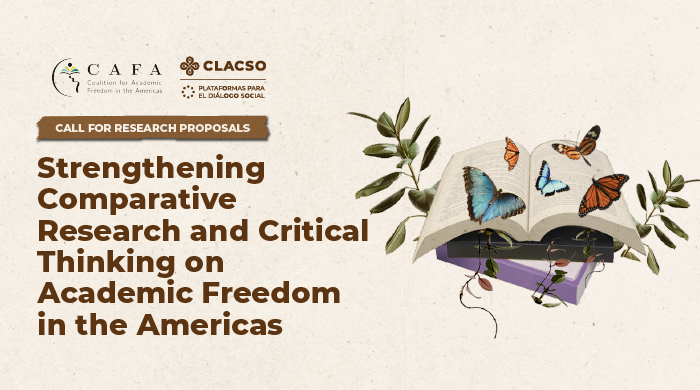Researchers from throughout the Americas are invited to apply. The fellowship aims to consolidate research efforts to complement and strengthen the implementation of the Inter-American Principles on Academic Freedom and University Autonomy.
Read the call for proposals here and find out how to apply.

The Coalition for Academic Freedom in the Americas (CAFA) and the Latin American Council of Social Sciences (CLACSO) announce the creation of the fellowship Strengthening Comparative Research and Critical Thinking on Academic Freedom in the Americas. Applications are open to research groups from across the Americas until 28 October: Read the call for proposals here and find out how to apply.
According to CAFA’s Executive Director, Camilla Croso, “through this initiative, CAFA and CLACSO expect to contribute to transforming the Inter-American Principles on Academic Freedom and University Autonomy from aspirational ideals into tangible realities. We believe that interdisciplinary collaboration and sustained research initiatives can pave the way for a more vibrant and resilient academic community in the Americas, where academic freedom thrives as an essential pillar of democratic societies”.
In addition, CLACSO’s Executive Director, Karina Batthyány, emphasized that “the alliance between the Coalition for Academic Freedom in the Americas and CLACSO is very important because it will allow us to promote comparative research and critical thinking on academic freedom issues in the Americas. Undoubtedly, it will allow us to do research within the framework of comparative studies and critical thinking, and it will also have an impact on countering threats to academic freedom, attacks on the social sciences, humanities and the arts, as well as threats to academic and university democracy and democracy in general in the Latin American and Caribbean region. We are very pleased to have the opportunity to launch this alliance and, of course, to strengthen it.
In turn, Pablo Vommaro, Academic Secretary of CLACSO, expanded by saying that: “We must strongly disseminate the results of the research that we can produce in the landmark of this alliance between CAFA and CLACSO, in order to be able to work on issues related to academic freedom, the strengthening of democracy, the promotion and consolidation of democracy, the promotion and consolidation of scientific-technological systems of higher education throughout Latin America and the Caribbean.”
As CAFA and CLACSO, among other scholars, have pointed out, this topic still lacks deeper conceptualization efforts within this region and beyond, especially in face of the escalating attacks on academic freedom led by individuals, groups, and even governments in different countries.
The fellowship will foster knowledge production across the hemisphere especially focusing on five themes: academic freedom and the pursuit of democracy; academic freedom and the strengthening of science and knowledge; the relation between academic freedom and technologies; university autonomy; and overcoming structural inequalities.
There are three main goals to be achieved through this fellowship: to increase knowledge and understanding of academic freedom issues in the Americas through a comparative approach; to create a critical mass of researchers across the region who will contribute to this field of research and inspire other scholars to join this field; and to disseminate the results of the research, raise public awareness of its existence and implications, and also contribute with important resources to the work of policymakers, UN institutions, civil society actors, and other interested parties to advance the respect and protection of academic freedom as a fundamental human right.
Applications are open!
Applications from collective research groups can be made until October 28, 2024. For further instructions, please click here to read the Fellowship Call and apply.
Meet the organizers
The organizations behind this initiative are both committed to science, research, democratic governance, and human rights.
CAFA is a non-governmental and not-for-profit network, created in 2021, headquartered at the University of Monterrey (UDEM), Mexico. It was founded by Scholars at Risk, UDEM, and the Human Rights Research and Education Centre (HRREC) at the University of Ottawa. CAFA seeks the promotion, protection, and respect for academic freedom and university autonomy, with the goal of developing relevant human rights standards that serve to protect educational spaces, leverage human rights and strengthen democratic principles in the Americas.
CLACSO is an international non-governmental institution with associate status at UNESCO, created in 1967. CLACSO brings together 938 research and postgraduate centers in the social sciences and humanities in 57 countries of Latin America, the Caribbean and other continents.
